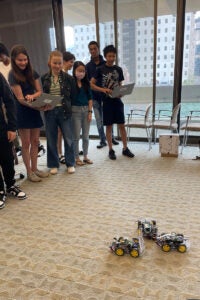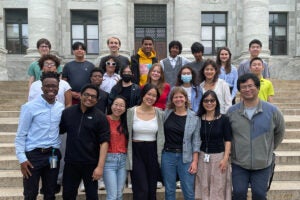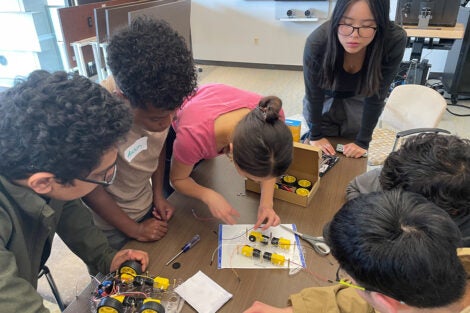August 3, 2023 – In a carpeted hallway, several random objects lie scattered across the floor—a bag of chips here, a single shoe over there. Suddenly, a toy car ambles toward the objects, driving itself in a straight line. It abruptly stops in front of the chips, recognizes the obstacle, and makes a sharp turn. Then it sets along its new path, only to be blocked by the shoe. When it takes in the situation and decides to back up, a loud round of applause breaks out.
A group of high school students crowds around the car, cheering their success in making a self-driving car. The driving demonstration is the culmination of two weeks of hard work at the Data Science in Action camp, a summer program focused on computer programming and artificial intelligence—machine learning in particular—run by the Translational Data Science Center for a Learning Health System (CELEHS) at Harvard T.H. Chan School of Public Health and Harvard Medical School.
“Our main goal is to provide high-quality exposure to data science and machine learning to students who otherwise would not have that resource,” said Tianxi Cai, John Rock Professor of Population and Translational Data Sciences. She is the director of CELEHS and one of the faculty co-directors of the program, along with Junwei Lu, assistant professor of biostatistics at Harvard Chan School, and Jessica Gronsbell, an assistant professor in the Department of Statistical Sciences at the University of Toronto.
Started in 2019, the camp has been geared mostly toward students in the Boston area—including those from underrepresented groups—drawing over 120 participants to date. This year, the camp expanded to California, hosting 16 students at Harvard and 12 students at San Jose State University.
Building a ‘toy Tesla’
The students start by attending lectures, learning first how to program and then how to develop machine learning algorithms. The lectures feature examples of how machine learning can be applied to health—for instance, quickly analyzing x-ray images to help diagnose diseases. At the 2023 camp, lectures were taught virtually and in-person in Boston by Lu, Gronsbell, and Kun-Hsing Yu, assistant professor of biomedical informatics at Harvard Medical School—and all of them were livestreamed for the California participants. Additionally, the lectures were recorded so that they can later be shared, along with programming resources, with other institutions interested in running programs of their own.

After the lectures, when it comes time for students to put the concepts into practice, they are tasked with building and programming a self-driving car, receiving help from on-site teaching assistants at both locations.
“The reason we chose a self-driving car is every kid is curious about it. You’ll hear it on the news,” Cai said. “We joke that it’s a toy Tesla so that the kids can relate to and feel interested about it.”
Working in teams, students build cars that have an on-board camera. They then take photos of objects and feed them into a machine learning algorithm, teaching the cars how to recognize and respond to the obstacles while driving.
Careers in data science
In addition to building the cars, students attend seminars featuring data science professionals who share their journeys through different career paths in academia and industry.
Nazir Canty, a rising junior at Arlington High School who participated in the 2023 camp, said that the seminars exposed him to new career options, such as becoming a biostatistician or epidemiologist. “I didn’t even know that those were things, and then they talk about it and give it to you in detail,” he said.
Canty decided to attend the camp because of his interest in engineering and programming. He had previously tried his hand at building devices such as remote control cars, but wanted to take his skills to the next level.
“I’ve always been interested in coding, but I just couldn’t figure it out,” he said. At the camp, he had the chance to learn programming not only from the instructors, but also from fellow students. “Some people in our group had been coding for a long time, and I hadn’t even touched it yet—which was great,” he said.
After finishing the camp, Canty plans to build his own self-driving car and find different ways to improve it, potentially as part of a school project.

Another participant in the 2023 camp was Ida von Gadow, a rising junior at German International School Boston. Over the past couple of years, she has been exploring her interest in programming by herself through creating video games and websites, but the camp provided many new opportunities.
Von Gadow said that the camp not only solidified her interest in further studying computer science, but also sparked her interest in math. “It’s made me think—in the future, is that maybe something I’d want to pursue? It’s opened that door for me a little bit as well,” she said.
“In school, in general, you don’t meet people who are interested in [computer science],” she added. “Here’s a room full of people who love computer science and math, and that is so cool as a teenager to be able to experience.”
– Jay Lau
Photos of participants with cars: Amanda King
Group photo: Suqi Liu
